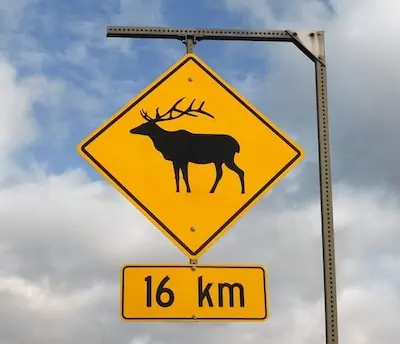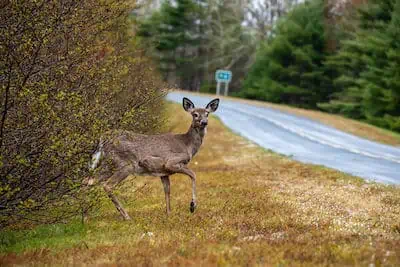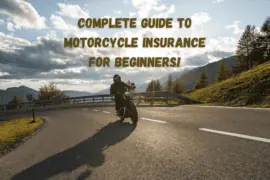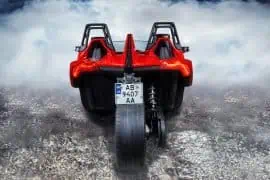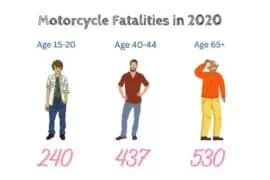When you ride along fun, rural roads, there is always a chance that you could strike an animal. You might not be worried about a squirrel or a rabbit; the risk of hitting something bigger should be in the back of your mind.
Although deer-motorcycle accidents are uncommon, about 200 riders lose their lives yearly from these collisions.
Didn't You Try Our Quote Comparison Tool Yet? Save BIG by Doing it!
Table of Content
What to Do After Hitting a Deer
If you hit a deer while riding your motorcycle, please take the following steps to ensure you are safe. Pull off the road, make sure you’re visible, and use road flares if available to warn other riders and drivers.
Once you are safe, you’ll want to take the following actions.
- Call the police to inform them of the accident, especially if the animal is blocking traffic. An official report is often needed if property damage or an injury happens. Your insurance company might require that paperwork to file a claim.
- Document the accident by taking as many pictures as possible. If a witness saw the incident, try to get a statement from them or ask for their contact info so that someone else can follow up with them later.
- Avoid the animal. A wounded deer will be frightened and try to flee if it is still alive. Its antlers and hooves are sharp and could injure you.
- Contact your insurance agent to file your claim and report injuries or damage as soon as possible. Most providers have an online filing process for you to follow.
- Examine your motorcycle for loose components, fluid leaks, and other damage before trying to ride it.
It is illegal in some states to leave the scene of an accident involving a deer. It is always better to contact the police and deal with the issue, even if it is to ensure you can file a claim.
Does My Motorcycle Insurance Cover an Animal Strike?
Most riders carry three forms of motorcycle insurance: liability, collision, and comprehensive. If you financed the purchase of your bike, you likely have all three assigned to your policy.
Liability insurance doesn’t usually cover a motorcycle-deer accident. Some exceptions, such as negligent driving or property damage from the incident, might fall into that category in rare instances.
Collision is responsible for accidents with the property. Since deer are considered wild animals, it does not meet this criterion. The only exception would be if you happened to strike a deer with your bike near an animal shelter where they were privately owned, and even then, the insurer would likely lean toward a comprehensive claim.
If you only carry liability insurance, your coverage will not typically cover an animal strike.
Is Hitting a Deer Considered an Act of God?
Force majeure events are commonly referred to as “Acts of God.” These items are defined as events that you cannot foresee, such as lightning striking your motorcycle or an earthquake causing the ground to swallow it.
Most insurance companies classify a deer strike in this category. Two elements typically need to be present for this classification to occur.
- The motorcyclist had no intention of hitting the deer.
- There was no way to predict that the animal would be on the road.
Imagine that a motorcyclist is taking a ride down a highway in the early morning. Suddenly, a deer jumps out from the trees. Although the front brake is covered, there’s no way to avoid the collision. The animal is fine, but the fork is bent, the wheel is broken, and both tires are flat. In most circumstances, this incident would qualify as a force majeure event.
Now imagine that a motorcyclist sees a deer along the shoulder. The bike is an older model, so the rider decides to clip the animal to file a claim. If that action could be proven, it would be denied by the insurer because the rider decided to hit the deer.
Force majeure always covers an issue that falls outside of your direct control.
What Type of Insurance Do I Need to Cover Hitting a Deer?
When you ride and hit something on the road, the damage is typically covered under a collision policy for your motorcycle.
Although some insurers use this option for animal strikes, most place an accident in this category in the comprehensive section of your motorcycle coverage. Insurers do this because deer are considered to be a random variable.
The policy will cover the remaining amount if the damage from the deer strike is more than your deductible.
Riders that only carry liability coverage for their motorcycles don’t typically have a way to file a claim after hitting a deer. The exact details of what is permitted in each case can be found in the terms outlined in the policy.
Do Deer Accidents Raise My Insurance Rates?
Most insurers will not raise your insurance rates if you strike a deer with your motorcycle. Because an animal strike is considered a comprehensive claim, it gets put in the same category as other environmental damage, like the following.
- Hail or wind damage from a thunderstorm.
- Theft or vandalism.
- Fire or flood damage.
- Falling objects, including tree branches.
This information assumes that the damage comes from striking the deer with your motorcycle. If you swerve to miss the animal and hit a tree, you’ll need to have collision coverage pay for the damage.
Your rates could increase if you tapped into your collision protection after an accident.
Some insurers raise your premiums if you’ve filed a specific number of claims in a short time. If your deer-motorcycle accident puts you over the top in that area, you could pay more for your coverage upon renewal.
How to Keep Deer Away from Your Motorcycle?
Instead of investing in a deer whistle for your bike, consider taking some practical, common-sense tips to keep these animals away from your motorcycle.
The goal should be to remain upright. Brake hard until you expect an impact to occur to stay stable. That technique will give you the best chance of having a successful result.
It also helps to practice your emergency braking skills periodically throughout the year. If you can act on instinct when a deer darts out in front, you’ll be more likely to make the correct decisions.
The places where hitting a deer are the highest are West Virginia, South Dakota, Iowa, Montana, and Pennsylvania. Any rural road could be a place where a deer is waiting. With the right skills and insurance protection, you’re more likely to walk away without experiencing a loss.
Use This Tool for Free and Save on Quotes!

